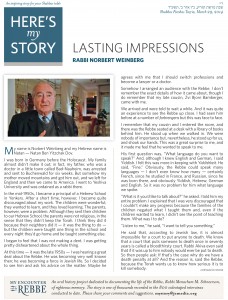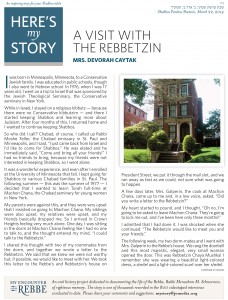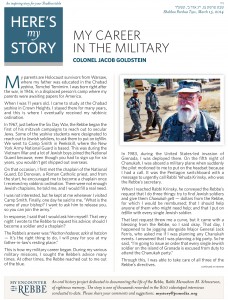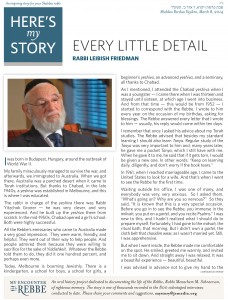HMS: Lasting Impressions
My name is Norbert Weinberg and my Hebrew name is Natan – Natan Ben Yitzchak Dov.
I was born in Germany before the Holocaust. My family almost didn’t make it out; in fact, my father, who was a doctor in a little town called Bad-Nauheim, was arrested and sent to Buchenwald for six weeks. But somehow my mother moved mountains and got him out, and we left for England and then we came to America. I went to Yeshiva University and was ordained as a rabbi there.
In the mid-1950s, I became a principal of a Hebrew School in Yonkers. After a short time, however, I became quite discouraged about my work. The children were wonderful; they wanted to learn, and they loved learning. The parents, however, were a problem. Although they sent their children to our Hebrew School, the parents were not religious, in the sense that they didn’t keep the Torah. I think they did it because their neighbors did it – it was the thing to do – but the children were taught one thing in the school but every night they’d go home and be taught something else.
I began to feel that I was not making a dent. I was getting pretty disheartened about the whole thing.
At this time – it was the late 1950s – I was hearing a great deal about the Rebbe. He was becoming very well known then; he was becoming a force in Jewish life. So I decided to see him and ask his advice on the matter. Maybe he agrees with me that I should switch professions and become a lawyer or a doctor.
Somehow I arranged an audience with the Rebbe. I don’t remember the exact details of how it came about, though I do remember that my late cousin, Bjorn Bamberger, came with me.
We arrived and were told to wait a while. And it was quite an experience to see the Rebbe up close. I had seen him before at a number of farbrengens but this was face to face.
I remember that my cousin and I entered the room, and there was the Rebbe seated at a desk with a library of books behind him. He stood up when we walked in. We were nobody of importance but, nevertheless, he stood up for us, and shook our hands. This was a great surprise to me, and it made me feel that he wanted to speak to me. (more…)








